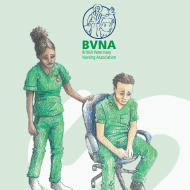BVNA launches campaign on chronic illnesses and conditions

79 per cent of respondents from the BVNA survey said that they had been affected by or diagnosed with a chronic illness or condition.
On 1 August 2021 the BVNA will launch its Chronic Illness Campaign (CIC), which intends to foster a better working environment for and understanding of veterinary nurses suffering from chronic illnesses and conditions.
The CIC comes after a BVNA survey found that 93 per cent of veterinary nurses with chronic illnesses and conditions feel guilty about not being able to carry out their role fully, making them less likely to take the necessary time off.
Also found by the survey was the fact that 83 per cent of veterinary nurses with chronic illnesses and conditions said that their work place does not have support protocols for them.
Of the veterinary nurses with chronic illnesses and conditions, only 52 per cent felt supported by colleagues when needed, and only 40 per cent felt that their line manager had been helpful in situations where support was necessary.
For the CIC, the BVNA is releasing podcasts, online information, and VNJ articles, alongside four free to attend webinars, which will take place over August and September.
Topics for the webinars are as follows; 'A VN Listening Group – a webinar to share the tools we use to help us live with chronic illness', taking place on 10 August, and 'Resilience for life with a chronic illness or condition', taking place on 19 August.
The other two webinar topics are 'Chronic illness and communicating what you need', scheduled to take place on 14 September, and 'Chronic illness, VNs and the Equality Act at Work', on 21 September. All webinars are scheduled to begin at 7.30pm on the allotted days.
Alex Taylor, who is the junior vice president of the BVNA, spearheads the campaign. She commented: “This campaign means a great deal to myself and the rest of the Council Members who are part of the BVNA chronic illness campaign task and finish group.
“Every one of us has had to deal with our own challenges as working as a veterinary nurse with a chronic illness or condition - we know how it feels and we want to help and make a real difference to people’s lives.
“As well as offering support to affected nurses, we also wanted to reach out to their colleagues, line managers and employers. We felt that having empathetic, supportive and well-informed colleagues is a key part of helping those affected by chronic illness to thrive in the workplace.”



 The Federation of Independent Veterinary practices (FIVP) has announced a third season of its podcast, Practice Matters.
The Federation of Independent Veterinary practices (FIVP) has announced a third season of its podcast, Practice Matters.